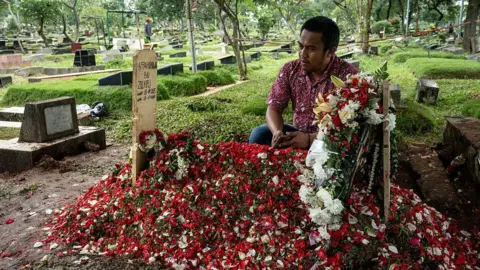More than 1,000 children have fallen ill from free school lunches in Indonesia this week, according to authorities – the latest in a string of mass food poisoning events linked to President Prabowo Subianto's multi-billion-dollar nutritious meals programme.
Yuyun Sarihotima, head of West Java's Cipongkor Community Health Center, told BBC Indonesia that the total number of poisoning victims recorded between Monday and Wednesday had reached 1,171.
It follows the poisoning of 800 students last week in West Java and Central Sulawesi provinces.
President Prabowo has made the nutritious meals programme – which aims to offer free lunches to 80 million school children – a signature of his leadership.
But a spate of mass food poisoning incidents has led non-governmental organisations to call for authorities to suspend the programme due to health concerns.
Muhaimin Iskandar, Coordinating Minister for Community Empowerment, said on Wednesday that there are no plans to stop it.
Victims of the recent outbreaks complained of stomach aches, dizziness, and nausea – as well as shortness of breath, which is a non-typical symptom of food poisoning.
Previous cases of food poisoning stemming from the free lunch programme have cited negligent food preparation as a suspected cause.
This week's victims ate meals that included soy sauce chicken, fried tofu, vegetables and fruit – but past poisoning incidents have been linked to expired sauce and, in one case, the serving of fried shark.
The head of Indonesia's National Nutrition Agency Dadan Hindayana said on Wednesday that the mass food poisoning in Cipongkor last week was the result of a technical error by the Nutrition Fulfillment Service Unit (SPPG).
The SPPG's operations in Cipongkor have reportedly been suspended, according to the National Nutrition Agency.
West Bandung regent Jeje Ritchie Ismail said his party had declared the mass poisoning in Cipongkor an extraordinary event so that handling can be faster and more comprehensive.
Cipongkor is where the first suspected case of this week's mass poisoning occurred on Monday – with the number of victims quickly increasing to some 475 students.
On Wednesday, another mass poisoning in Cipongkor saw as many as 500 students fall ill after consuming free lunches.
The National Narcotics Agency (BGN) reported that from January to 22 September, there were 4,711 cases of free school lunch poisoning. The majority of cases occurred on the island of Java.
However, a higher figure was reported by the Indonesian Education Monitoring Network (JPPI). This NGO recorded that as of 21 September 21, the number of poisoning victims had increased to 6,452 children.
This abnormal situation should require the government to declare an outbreak and temporarily halt the program for a thorough evaluation, said JPPI National Coordinator Ubaid Matraji.
Some have called for changes to the scheme, including a proposal that funds be distributed directly to parents so that they can prepare meals for their children instead. The BGN has previously rejected this idea.
Across the world, programmes offering free meals to students have proved to be effective in improving health, academic performance and attendance.
But Indonesia's $28bn (£21bn) version - shaping up to be the most expensive of its kind - has become the growing target of food safety concerns and heated anti-government protests.
A centrepiece of Prabowo's presidential campaign last year, the free meals programme was pitched as a way to tackle stunting - a condition caused by malnutrition that affects a fifth of children below the age of five in Indonesia.
Since he took office last October, this programme has earned him political points, despite its implementation issues. The cost and effectiveness of the programme remain contentious among experts and officials alike.


















